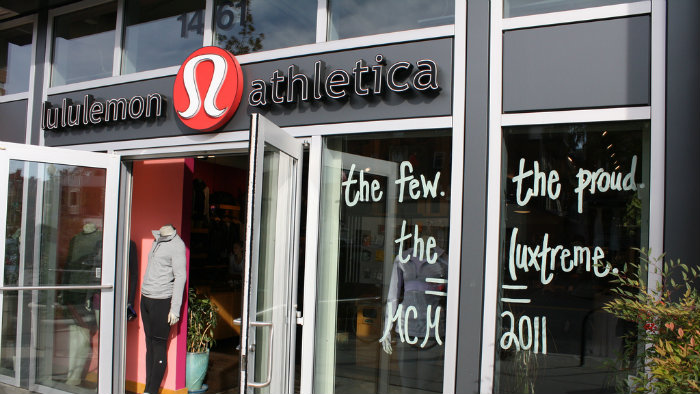
Canaccord Genuity Group Inc. (TSX:CF) analyst Camilo Lyon, who covers a mix of footwear, apparel, and outdoor living brands in Canada and the U.S. for the small Canadian investment bank, came out with a reiteration of his sell rating on Lululemon Athletica Inc. (NASDAQ:LULU) September 22.
While I commend his radical opinion — he’s one of just two analysts with a sell recommendation out of 36 covering LULU — here’s why he’s climbing the wrong tree.
Surveys manipulate
Lyon’s “survey” assessing the future buying intentions of Lululemon customers is meaningless as a data point for understanding the company’s customer base.
Let’s say I’m a big drinker of Johnnie Walker Scotch whiskey.
You want to know my future purchasing intentions over the next 12 months versus my purchases over the previous 12 months for both Scotch whiskey and, say, American whiskey or bourbon. Well, you’d ask me how many bottles of each I bought in the last year and how many I intend to buy in the upcoming year.
Simple, right? Only, I have no idea how many bottles of each I purchased in the last year or how many I’ll buy in the next year, so you give me some options. Human nature being what it is, I’ll overestimate my Scotch whiskey purchases over the past 12 months (remember, I’m a Johnnie Walker fan) and then underestimate them over the next 12 months, because now I have a choice other than Scotch whiskey.
The same applies to yoga pants and denim.
Competitive concerns
Lyon is trying to make the case — one that’s become incredibly old — that denim is making a comeback. If that’s so, why in Canaccord’s survey did 68% of the LULU customers say they wear athletic/yoga pants for activities other than yoga and working out? If denim was indeed taking over, that number should be a heck of a lot lower.
The analyst also makes the case that Athleta, the Gap’s version of athleisure wear, is gaining popularity with Lululemon customers.
“We are also witnessing some shifts in brand preferences away from Nike and Under Armour, and in favour of Athleta,” writes Lyon. “Athleta’s rise could add to LULU’s competitive concerns particularly as Gap Inc. re-focuses its growth efforts on the concept.”
Let’s get something straight about Athleta.
First, its prices are considerably lower than Lululemon’s. There’s always going to be a percentage of LULU customers that are considering cheaper options for some of their clothing needs, but those customers aren’t the “real” customer base that’s loyal to the brand. Those customers are just as likely to shop at Old Navy or the Gap as they are Athleta.
Second, and this is a big one, Lululemon has held its own against Nike Inc., Under Armour Inc., Athleta, and VF Corp.’s Lucy brand for a long time. CEO Laurent Potdevin has done an excellent job keeping the brand on point and executing its plan against what Lyon is right to categorize as a tough group of competitors. LULU has earned its place in the sporting goods marketplace.
Lastly, Gap bought Athleta in 2008 for $150 million, at a time when Lululemon was still finding its way. Athleta has done little to take the competition to LULU. Furthermore, Gap is being forced to focus on Athleta and Old Navy because of Banana Republic and, to a lesser extent, its legacy brand performing poorly.
Bottom line
Right now, Under Armour is struggling badly. It needs a lifeline. Lululemon’s stranglehold on the women’s market makes it a desirable dance partner, but Adidas or even Puma, which are owned by deep pockets, would gladly pay a premium valuation to keep LULU away from one of their biggest competitors in the footwear market.
So, the argument that private equity won’t pay nosebleed prices is a moot point, because Lululemon doesn’t need them with more than one strategic buyer lurking in the background.
Before you sell your LULU stock, you might want to consider whether one analysts’ sell recommendation is worth leaving significant profits on the table.







